
Cast members – Church Hill Theatre’s production of “Pippin: His Life and Times” Photo by Jane Jewell
Pippin, now playing at Church Hill Theater, is the story of a young prince in his quest to find a meaningful life – a timeless story that resonates as clearly now as it did in its original 1972 Broadway production.
Directed by Sylvia Maloney, the musical deploys a large cast of singers and dancers in a high-energy spectacle that revolves around a troupe of performers who tell Prince Pippin’s story. The music and lyrics are by Stephen Schwartz, with a book by Roger Hirson.
The original Broadway production, partially financed by Motown records, was highly successful, running on Broadway for almost five years. It opened in October of 1972 and closed, after 1,944 performances, in June of 1977. Most Broadway shows open and close within a year. More successful ones can run a few years. At almost five years, Pippin, as of February 2018, is the 34h longest-running show in the entire history of Broadway. That’s pretty impressive. Directed by the internationally famous director and choreographer Bob Fosse, Pippin won five Tony awards – two for Fosse, as director and choreographer, one for Ben Vereen as leading actor, and for Tony Walton (scenic design) and Jules Fisher (lighting design). It also won four Drama Desk awards – two for Fosse, one for Walton, and one for Patricia Ziprodt (costume design). And unusually enough, a 2013 Broadway revival took another load of awards – including a Tony for Patina Miller in the same role as Vereen – the only time the award has gone to a man and woman actor playing the same role.
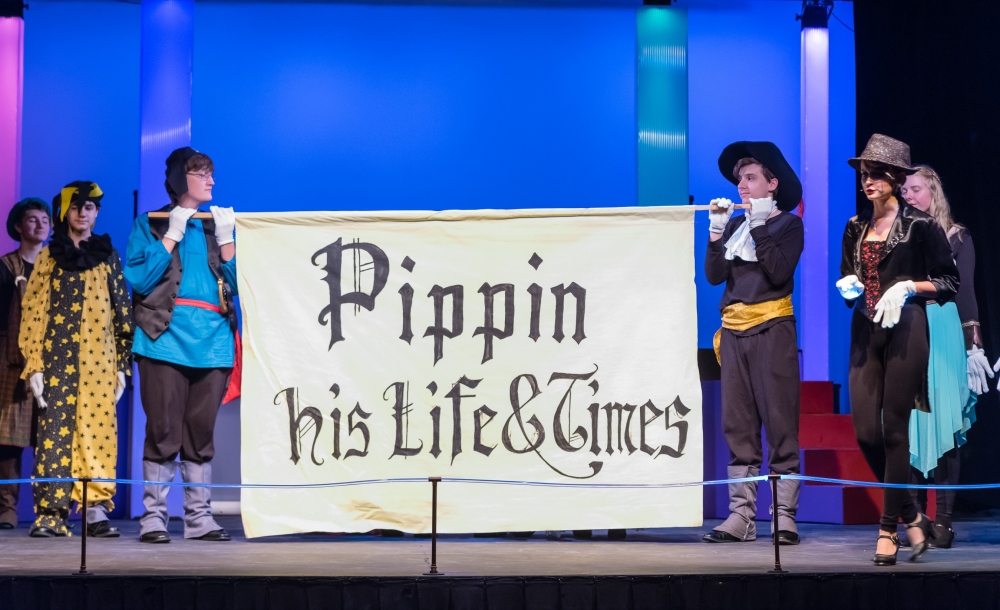
Church Hill Theatre’s production of “Pippin: His Life and Times” Photo by Steve Atkinson
The plot is centered on the title character, Pippin, the son and heir of Emperor Charlemagne, the French ruler who created the Holy Roman Empire by conquering much of western Europe. But beyond the characters’ names, the historical element is largely irrelevant, giving an essentially mythological plot a perfunctory grounding in the world of the Middle Ages. The story sets up a prototypical generational conflict, with the king neglecting his bookish son, and the son rebelling against what he sees as his father’s outmoded, ways. The entire story is presented as a performance by the strolling players who make up the ensemble – taking the parts of soldiers, peasants, courtiers, and others needed to fill in the subsidiary roles of the play. It’s an example of the classic technique of “a play within a play.”
Ater finishing his education at the University of Padua, Prince Pippin visits his father’s court and decides to take his place as a warrior, emulating his younger half-brother Lewis. But he shows no aptitude for strategy or leadership, and after his first battle and discovering that he dislikes killing, he flees to his grandmother’s court. Renouncing the life of a soldier, Pippin turns to a life of leisure and pleasure–wine, women, and song! But that ultimately proves unfulfilling, too. When the leading player suggests that he rebel against his father’s autocratic ways, he enthusiastically takes on that role – only to learn that overthrowing the government doesn’t necessarily lead to replacing it with something better. The young prince continues to search, eventually coming to a recognition that the road to happiness doesn’t necessarily require extraordinary accomplishments.
Maloney has brought together a cast including both CHT regulars and some young newcomers, particularly in the ensemble where it seems as if half the players are sophomores at Queen Anne’s County High School! The energy of the production gets a definite boost from all the young people on stage.
Leading the “youth brigade” is Mackenzie Campbell, who is outstanding as the Leading Player – a sort of ringmaster who conducts the entire performance. Singing, dancing, or simply standing at one side of the stage, she is a dominant presence. She has a number of credits with the Tred Avon Players and the Avalon Theater, but this is her CHT debut. Hard to believe she is only 17 years old; if she stays active in theater, it’s easy to foresee a bright future for her.

Mark Wiening as Pippin in Church Hill Theatre’s production of “Pippin: His Life and Times” — Photo by Steve Atkinson
Mark Wiening, who has appeared regularly both at CHT and at the Garfield Center, brings a strong singing voice and solid acting chops to the role of Pippin. A good performance in a role that demands a wide range of emotions and no small amount of physical schtick.
The role of Charlemagne is played by Bob Chauncey, who brings an appropriately regal bearing to the part. At the same time, he brings out the character’s comic side as a typically distracted father who has little time to talk to his son or understand his concerns.
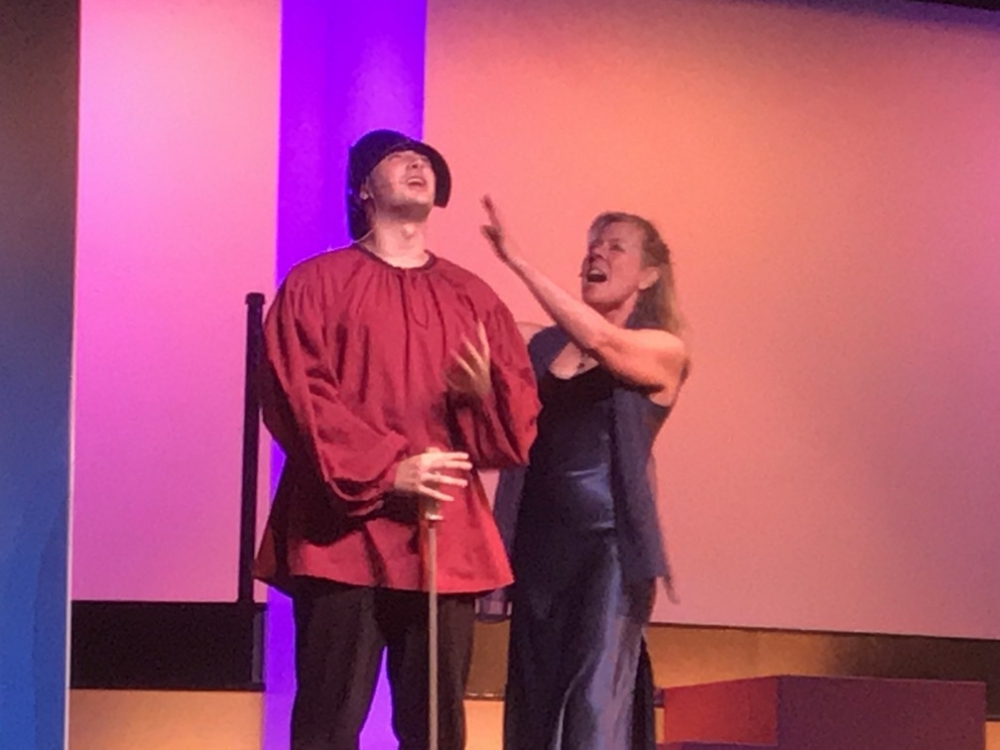
Fastrada (Lori Armstrong) encourages her son Lewis (Bryce Sullivan) to show his warlike qualities in Church Hill Theatre’s production of “Pippin: His Life and Times” — Photo by Jane Jewell
Lori Armstrong is outstanding as Fastrada, Lewis’s scheming mother. She brings a good singing voice and a deliciously wicked persona to the role. Armstrong is returning to the stage after directing many student productions in her role as a Theater Arts teacher at Kent County Middle School. Let’s hope a taste of the spotlight encourages her to take part in more local productions.
Debra Ebersole is well cast as Berthe. Pippin’s grandmother. Her solo number, “No Time at All,” is one of the highlights of the first act; a nice performance by one of the long-time stalwarts of CHT musical productions.
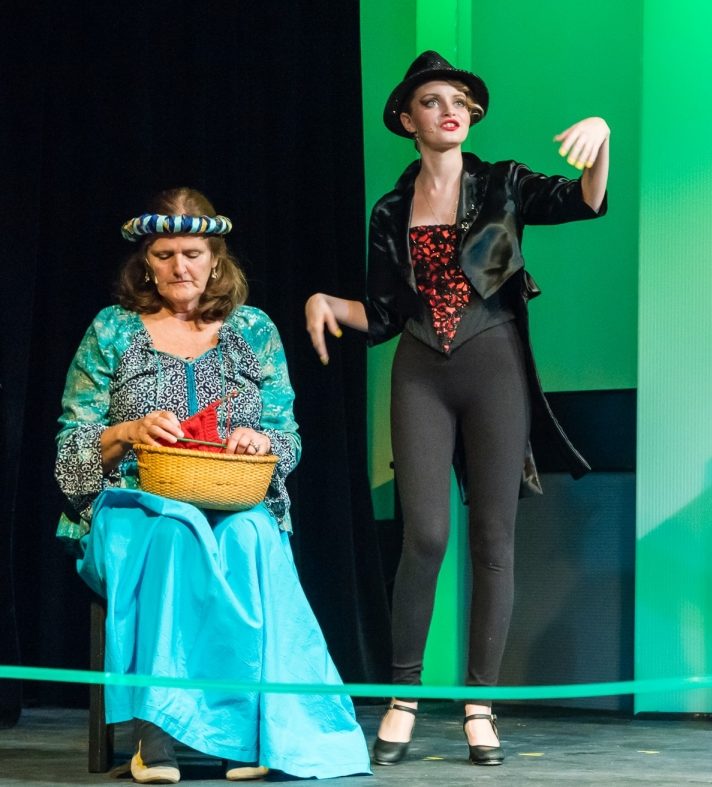
Debbie Ebersole as Pippin’s grandmother & Mackenzie Campbell as The Leading Player in Church Hill Theatre’s production of “Pippin: His Life and Times” Photo by Steve Atkinson
Pippin’s love interest, the widow Catherine, is played by Becca Van Aken, another CHT regular. The character is central to the play’s ultimate resolution, and Van Aken gives her a solid reality that makes the prince’s relationship with her seem natural and credible.
Bruce Sullivan a recent Queen Anne’s High School graduate, plays Lewis, Pippin’s half-brother – a more athletic and warlike (and considerably less intellectual) prince. And Cullen Williams, a Queen Anne’s freshman, does a good job as Theo, Catherine’s son.
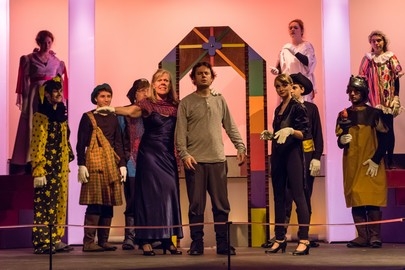
Fastrada tells Pippin her motto: “Spread a Little Sunshine” — Photo by Steve Atkinson
The costumes are an integral part of this production – kudos to Tina Johnson, Erma Johnson and Liz Clarke for the spectacular look of the players. Interestingly, while most of the other characters are elaborately costumed, Pippin himself is dressed very plainly – a subtle way to emphasize his “Everyman” status, despite his official position as a prince and heir to the throne.
The choreography is also outstanding, thanks to Calvin Moore. Whether it’s a slow-motion battle scene (almost a “soft shoe” performance) or a formal dance at the emperor’s court, the swirl of motion is almost constant, and the cast does it without a misstep.
Despite the participation of Motown Records – several of whose stars recorded songs from the show – Pippin doesn’t feature particularly memorable music. Other than the main character’s signature song, “Corner of the Sky,” most of the songs are vehicles for clever words rather than melodies the audience is likely to find themselves humming the morning after seeing the show. On the whole, the CHT cast does a good job of making the songs work within the context of the play, and the orchestra, led by Ray Remesch, accompanies them in idiomatic style. Remeshch’s smooth work on guitar was notable at several spots in the performance.
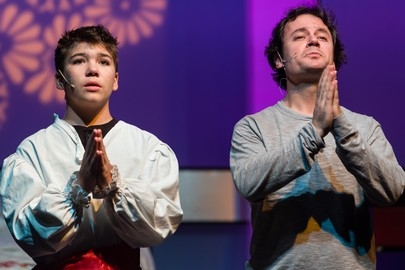
Theo and Pippin pray for a duck – Church Hill Theatre’s production of “Pippin: His Life and Times” — Photo by Steve Atkinson
As Maloney notes in her director’s notes, it is easy to see the play as an echo of the doubts and dissatisfactions of the early 1970s, a time of political turmoil and social experimentation. The young prince’s search for meaning in his life is, of course, a quest that almost every generation finds itself embarking on. With its energetic young cast and a sprinkling of canny veterans, the CHT production should have a natural appeal to the young — and to those who remember what it was like to be young at a time when the world seemed full of possibilities and challenges.
Pippin runs through June 24, with performances at 8 p.m. Fridays and Saturdays and at 2 p.m. Sundays. Tickets are $20 for adults and $10 for students. Reservations are strongly recommended; call the theater at 410-556-6003 or visit www.churchhilltheatre.org to get your advance tickets.
###



Write a Letter to the Editor on this Article
We encourage readers to offer their point of view on this article by submitting the following form. Editing is sometimes necessary and is done at the discretion of the editorial staff.